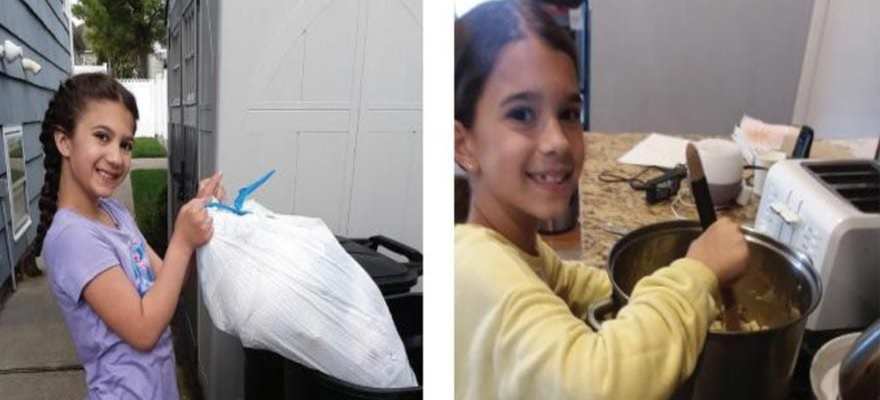
Being on pause during the COVID-19 pandemic doesn’t mean parents have to bear all the household responsibilities from 9 to 5 and beyond.
Juggling a lot more work and responsibilities during the stay at home order is a perfect time for parents to encourage young children and teens to take on household chores.
“Our kids know that we are a team and everyone has responsibilities,” Melissa Illuzzi of Princess Bay said of Sophia, 11, Isabella, 10, (pictured above) and Angelo, 4. “They are all very independent for their age.”
She feels blessed that her children began doing chores at a young age.
The girls cook about five mini meals each week with supervision from her and her husband; as well as clean their rooms, take out the trash, and do laundry, while their brother sets the table and has started making his bed.
Staten Island parents, like Mrs. Illuzzi, agreed that chores are a stepping stone to teaching kids teamwork, independence, and responsibility — and that it’s never too early to start. With all the extra shopping, cooking, cleaning, organizing, yard work, and other household jobs, the quarantine period is a good time for parents to enlist their kids’ help around the house — especially if they’ve never done chores before.
“I feel it’s important because it teaches them life skills,” Christine Sengel Stanley of Rossville said. “It also makes them become more independent, and it does help me out — especially when all our activities were going on” before quarantine, she explained.
Her three kids — Dylan, 15, Donovan, 11, and Victoria, 10 — unload the dishwasher, take care of the recycling, and just recently started putting away their clean laundry, according to Mrs. Stanley. Her kids have easily been able to keep up with their chores during the stay at home order, she said. “Most of their chores they do at night, so it doesn’t interfere with their remote learning,” Mrs. Stanley said.
Other parents, like Katherine Van Dyk, say incentives, like allowance, encourage kids to treat housework as their “job” and rely on getting a “salary” for their hard work.
“There is no battle because if they don’t work they don’t get paid,” the Graniteville mom explained of her 12-year-old daughter Katelynn and 14-year-old daughter Angelina under her pre-corona chore policy. Allowance has been put on hold while Ms. Van Dyk was out of work during the COVID-19 pandemic.
“Now they do chores and don’t get paid because I am not working,” she said in April. “Under the circumstances they understand what’s going on in the world,” she continued. “When we get back to normal we will resume.”
Under typical circumstances, however, she posts “jobs” with a compensation amount for each chore. For instance, they receive a dollar each time they do the dishes — for a weekly total of $7 if they do the dishes once a day for seven days.
Other chores she posts include cooking, pet care, laundry, mopping, sweeping and cleaning their rooms, with appropriate payment amounts. She’s among other parents who believe chores teach kids how to be self sufficient.
Her kids are pros in the kitchen as they have been cooking since they were as young as seven – and they share the weekly cooking duties, each responsible for cooking a meal and the other doing the dishes.
“Angelina cooks on Wednesday and that’s the day we eat cereal or starve!” she said.
In fact, she said they could cook an entire Thanksgiving meal all by themselves. “It has been implemented since they were young, so to them it’s just part of their routine,” Ms. Van Dyk said.
For her, childhood memories — like going to her grandparents’ house every Sunday with all her cousins — play as much a role in raising her own children as teaching independence. “If any of us were there during the time my grandfather was making the sauce you can bet your last dollar we were cooking it with him, no matter how young we were,” she recalled.
The early lessons she has enforced so far have paid off. “When I am sick they are completely capable of taking care of things and have,” she said, adding that they showed an early interest in what she was doing around the house.
“Then when they started to get older they wanted to be out more and do less around the house,” she said. She explained that if they wanted money they had to earn it — and that kept them interested. At Christmastime, Angelina saved $180 and Katelynn saved $200, which helped them purchase gifts for family members, she said.
Ms. Van Dyk tries to instill the traditions she shared growing up with her kids whenever possible. “It was an amazing time when I grew up,” she said. “I hope my kids will have the same memories.”
Meanwhile, other Staten Island parents say they have opted to start a chore routine with their children — even though they are still just toddlers.
Little Anna Sophia Steidell likes to help her mom sweep and mop with her own toy set — but on her own terms when she wants to, according to mom Kristen Steidell.
“Chores are definitely tough for a two and a half year old,” the Dongan Hills mom said. “We try to implement once you play with some toys, you can’t take out more until the first set of toys are cleaned up,” she added. “Some days it works, some days it’s a battle. Some days she’s in full on cleaning mode, which makes her feel she’s helping and has a responsibility,” Mrs. Steidell said.
At three and a half, Donovan Schumacher helps his mom Nicole set the table, cleans his room, helps his dad with the garbage, and helps feed the cats.
The Annadale mom began teaching Donovan small chores at a year old. “He does not do these things everyday, but it’s a start,” his mom said. “I think it’s good for them to have some sort of responsibility.”
“It’s the routine I believe is what works,” Mrs. Schumacher said. “I know for us, my husband included, routine keeps us on track.”
It’s game time when it comes to chores for Lucas Bouderau of Westerleigh.
The two and a half year old loves to shadow his mom Sara Bouderau around the house and enjoys making a game out of chores. She said they toss dirty laundry down the stairs from the hamper, then pick it up and race it to the laundry room.
“When I mop, he mops. He loves to vacuum. He tells me when I’ve missed a spot,” and sometimes tells her the house is dirty, she joked. “He’s more of a neat freak than I am,” she continued. “I guess because he sees me cleaning all the time, he thinks it’s just something else we do.”
As a toddler, though, he also loves to make messes, and getting him to pick up his own toys is never an easy task, Mrs. Bouderau said. “I know he’s very young, but I feel like if we start teaching him to keep things clean now, it’s less of a ‘chore’ later on,” she said.
Shaina Sarah of Great Kills agrees. She is teaching her 14-month-old daughter Savannah Joy how to tidy up during the day — with the hopes that the activity will become the norm as she grows up. Putting her “jammies” in the hamper, wiping up any messes, putting her toys away are all a precursor to building more responsibilities later on, according to her mom.
“It definitely takes longer to get things done, but I hope this is an investment and as she grows, I won’t have to spend as much time teaching her how to tidy up after herself,” Ms. Sarah said.
Staten Island-based writer Christine Albano remembers when her toddlers had lots of time to clean up their toys, but now at 22, 18, and 16, they help her with errands in between making Tik Tok videos, social media posts, and Zoom meetings.







